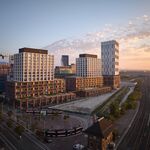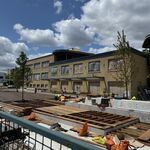kEiThZ
Superstar
I have a question to no one in particular. I live in a 1825sf 2-bedroom bungalow. Non-urban, so large lot, lots of trees. The sun is below the trees all winter. How many sf of solar panels would I need to leave the hydro and gas grid (sorry, I don't know the total roof area, which is currently covered in 2' of snow)? Not to live like an off-griding monk, but to live like we do now, heat, a/c, showers, lights, etc. D
Not sure about gas, but getting your electricity needs should be entirely possible.
Some very rough math....I can do more if you give me details.
I'm going to assume you use 30 kWh/day on average. And I'm going to assume 150 W/m2 from your shaded panels. 6 hr average sunshine per day through the year. You need 34 square meters of panels. Panels are generally 2 m2. So you need 17 panels. This is a somewhat conservative estimate. Better panels. Better placement. Etc. You could do less.
Do I get to choose which room I have to sacrifice and turn into a 'battery room' (please don't say in the attic - it's unheated, difficult to access, not engineered for load and no doubt there are safety/regulatory issues putting large capacity energy storage up there). I can provide annual electricity and NG consumption.
They battery packs aren't huge. Usually just wall mounted in a garage or a furnace sized stack in a utility closet.
Theres rules and codes. But not as tough as people imagine.
On the gas side, if you really wanted to do it, you could get your house updated to Passive House standard. Some of them can get through a Prairie winter with a heater that is a glorified hair dryer.
Last edited:





